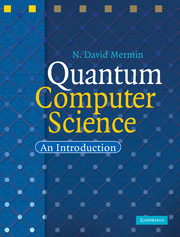
-
Select format
-
- Publisher:
- Cambridge University Press
- Publication date:
- 05 June 2012
- 30 August 2007
- ISBN:
- 9780511813870
- 9780521876582
- Dimensions:
- (246 x 189 mm)
- Weight & Pages:
- 0.678kg, 233 Pages
- Dimensions:
- Weight & Pages:
You may already have access via personal or institutional login
Book description
In the 1990's it was realized that quantum physics has some spectacular applications in computer science. This book is a concise introduction to quantum computation, developing the basic elements of this new branch of computational theory without assuming any background in physics. It begins with an introduction to the quantum theory from a computer-science perspective. It illustrates the quantum-computational approach with several elementary examples of quantum speed-up, before moving to the major applications: Shor's factoring algorithm, Grover's search algorithm, and quantum error correction. The book is intended primarily for computer scientists who know nothing about quantum theory, but will also be of interest to physicists who want to learn the theory of quantum computation, and philosophers of science interested in quantum foundational issues. It evolved during six years of teaching the subject to undergraduates and graduate students in computer science, mathematics, engineering, and physics, at Cornell University.
Reviews
'This is one of the finest books in the rapidly growing field of quantum information. Almost every page contains a unique insight or a novel interpretation. David Mermin has once again demonstrated his legendary pedagogical skills to produce a classic.'
Lov Grover - Bell Labs
'… will be a standard for instruction and reference for years to come. … The book is suffused with Mermin's unique knowledge of the history of modern physics, and has some of the most captivating writing to be found in a college textbook.'
David DiVincenzo - IBM T. J. Watson Research Center
'… Mermin has always been an entertaining and comprehensible writer, and continues to be in this book. I expect it to become the definitive introduction to this material for non-physicists.'
Peter Shor - Massachusetts Institute of Technology
'… Mermin's lucid prose and gentle humor cajole [students] toward a sound intuition for what it all means, not an easy task for a subject superficially so counterintuitive.'
Charles Bennett - IBM T. J. Watson Research Center
'… what it treats, it treats extremely well, with rigor and attention to detail that reveals a deep understanding of the subject. … Mermin's book adheres to a 'less is more' adage … Particularly outstanding are the self-contained treatments of Shor's factoring algorithm and its number-theoretic background and the discussion of the Greenberger-Horne-Zeilinger puzzle illustrating the nonintuitive, nonlocal aspects of quantum mechanics. … I truly hope that Mermin's book will nurture the next generations of scientists in their understanding of things quantum computational - or even just plain quantum.'
Source: Physics Today
'It is evident that the author has a great deal of experience communicating the subject matter. … the text is both clear and engaging. It is also lightened, and enlightened, by the author's wry sense of humour. Far greater and more learned reviewers than I have heaped praise on this book, and deservedly so. All I can do is add my small voice to their chorus or recommendations. For anyone interested in quantum computer science, or just seeking an engaging read on a topic at the forefront of science, this text comes highly recommended.'
Source: Mathematics Today
Contents
Metrics
Altmetric attention score
Full text views
Full text views help Loading metrics...
Loading metrics...
* Views captured on Cambridge Core between #date#. This data will be updated every 24 hours.
Usage data cannot currently be displayed.
Accessibility standard: Unknown
Why this information is here
This section outlines the accessibility features of this content - including support for screen readers, full keyboard navigation and high-contrast display options. This may not be relevant for you.
Accessibility Information
Accessibility compliance for the PDF of this book is currently unknown and may be updated in the future.


